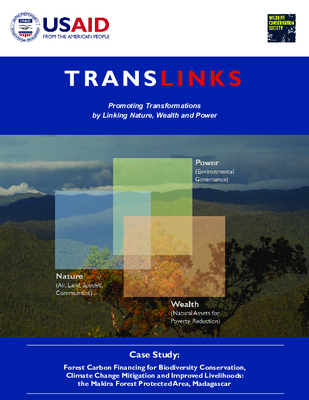Forest Carbon Financing for Biodiversity Conservation, Climate Change Mitigation and Improved Livelihoods: the Makira Forest Protected Area, Madagascar
Case study of the forest carbon project in Makira Forest, Madagascar. Wildlife Conservation Society, the Government of Madagascar and other partners have been working with local communities living in the Makira plateau in north-eastern Madagascar to establish a protected area which will be financed by the marketing and sale of CO2 emissions reductions credits. The funds from carbon sales, generated through the avoided deforestation of the Makira forest, will be used to finance the longterm conservation of the forests, improve community land stewardship and governance, and support sustainable livelihood practicesleading to improved household welfare. This study outlines the process and key steps that have been taken to develop this novel and innovative approach towards forest conservation and poverty reduction in one of the world’s most biologically rich and economically poor countries.
https://biodiversitylinks.org/projects/completed-projects/translinks/translinks-2008/wildlife-conservation-society/ForestCarbonFinancingMakira_CaseStudy_WCS_2008.pdf/view
https://biodiversitylinks.org/projects/completed-projects/translinks/translinks-2008/wildlife-conservation-society/ForestCarbonFinancingMakira_CaseStudy_WCS_2008.pdf/@@download/image/image.png
File
Forest Carbon Financing for Biodiversity Conservation, Climate Change Mitigation and Improved Livelihoods: the Makira Forest Protected Area, Madagascar
Author(s):
Holmes, Christopher,
Ingram, Jane Carter,
Meyers, David,
Crowley, Helen,
Victurine, Ray
Publication Date: 2008
Location: Makira Forest, Madagascar
DOWNLOAD FILE
Case study of the forest carbon project in Makira Forest, Madagascar. Wildlife Conservation Society, the Government of Madagascar and other partners have been working with local communities living in the Makira plateau in north-eastern Madagascar to establish a protected area which will be financed by the marketing and sale of CO2 emissions reductions credits. The funds from carbon sales, generated through the avoided deforestation of the Makira forest, will be used to finance the longterm conservation of the forests, improve community land stewardship and governance, and support sustainable livelihood practicesleading to improved household welfare. This study outlines the process and key steps that have been taken to develop this novel and innovative approach towards forest conservation and poverty reduction in one of the world’s most biologically rich and economically poor countries.



